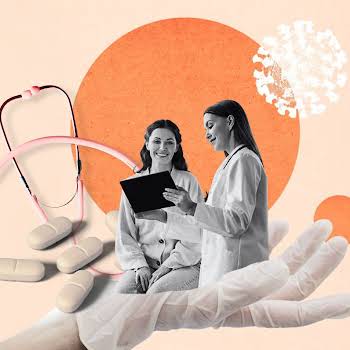Ask The Doctor: November is Lung Cancer Awareness Month — here’s everything you should know
By Sarah Gill
29th Nov 2022
29th Nov 2022
All your burning health questions answered by the professionals.
“What do you want people to know this Lung Cancer Awareness Month?”

Answer from Dr Paul Carroll, General Practitioner from Churchtown Medical in Dublin 14, which is part of the Centric Health network of GP practices in Ireland.
Dr Paul Carroll graduated in medicine from the University of Western Australia and trained as a GP before moving to Ireland in 2001 for a three-month working holiday. He is still here, and over the last twenty years he has been instrumental in the development of the Centric Health network of GP practices, starting with one practice in 2006 and which now numbers over 70 across Ireland. He has a strong interest in preventative health and keeping people well and is very experienced in skin cancer diagnosis and treatment, and men’s health. As well as being a full-time partner in his GP practice in Churchtown, he is Director of Communications for Centric Health and also sits on their Clinical Leadership Team.
He is passionate about improving communication between doctors and their patients, as well as the wider community. He has appeared regularly on TV, radio and has been a regular columnist on medical matters. He currently hosts GPTV, an interactive fortnightly webinar of over 100 colleagues from all over Ireland, which enables GPs and GP Nurses across the country to strive to maintain the highest clinical standards and safety in their quest to keep people healthy in their community.
November is international Lung Cancer Awareness Month, and it is the time of year when we particularly encourage people to check up on themselves and their loved ones to see if they may be at risk of developing lung cancer. Although the number of people smoking in Ireland has fallen in recent years, the incidence of lung cancer remains high. It is the fourth most common cancer in Ireland but sadly more people die from lung cancer in Ireland than any other cancer. This is because it is often diagnosed late when the treatment options can be much more limited.
The last few years have seen a further delay in diagnosis, when non-covid conditions took a back seat to the national response to the pandemic. The good news is that the health service is now back to normal, and the increased awareness of coughs in general since Covid has meant that many people are being diagnosed with lung cancer earlier, which dramatically improves their outcome from this disease.
So when should we be concerned about the possibility of lung cancer?
The good news is that most coughs are not caused by lung cancer, but it is certainly one of the main things we look for. If you, or someone you know, has any of the following symptoms, then it is well worth getting them checked out by your GP, just to be sure:
- A cough that doesn’t go away, or a change in a long-term cough
- Repeated chest infections that won’t go away, even after antibiotics
- Coughing up blood-stained phlegm
- Pain in your chest, especially when you cough or breathe in
- Swelling around your face and neck
- Wheezing or difficulty breathing
- Difficulty swallowing
- Other possible symptoms include:
- Feeling more tired than usual
- Loss of appetite / weight loss
But surely none of this applies to me, because I have never smoked?
Well, although smoking is by far the commonest cause of lung cancer, there are still many people who get lung cancer who have never smoked. Up to 10% of lung cancers are not caused by smoking, so even non-smokers, and also ex-smokers, need to be aware of this disease and take any of these symptoms seriously.
So, what should you do if you think any of those symptoms might apply to you?
Well, this is an easy one – you need to get checked by your GP. There’s no other way round it, I’m afraid, and your GP will be able to tell you if this is something to be concerned about or not. They may recommend you get a Chest Xray to look at your lungs, or they may suggest you get checked out in one of the Rapid Access Lung Clinics which are based in hospitals. These are consultant-led assessment and diagnostic services for patients with suspected lung disease, and as the name suggests, they usually see people very quickly. There are eight rapid access clinics located around the country, and your GP will send you to your nearest one.
And what happens there?
They will do a combination of various imaging tests (X-rays, CT scans and a fancy kind of ultrasound scan) as well as taking a sample of anything that looks suspicious with a biopsy which is often done by putting a camera into your lungs (called a bronchoscopy). The samples are sent to the lab and if any cancer is found, then the doctors will want to know four things about the tumour:
- What type of lung cancer it is
- What grade it is (what the cells look like and how fast they might grow)
- Are there any genetic markers that can help guide treatment
- What stage is it at (how big is it and how far has it spread)
- Once they know these things about the cancer, they can decide on the best type of treatment, and can also give an indication of the likelihood of the treatment being successful. Like most cancers, the later it is found, the harder it is to treat so ignoring it and hoping it will go away is what we call A Really Bad Idea.
Hmm… I don’t really like the sound of all that… How can I avoid getting lung cancer in the first place?
There are three important things to do if you want to reduce your risk of getting lung cancer in the future, and these are:
1. Stop smoking
2. Stop smoking
3. Stop smoking
I just can’t emphasise this enough. If you smoke, please please please do everything you can to find a way to stop. Most people need a few goes at quitting before they find a way that works for them, so don’t stop trying to quit. The HSE has a fabulous resource at www.quit.ie which tells you everything you need to know, and your GP is a source of wisdom on this subject as well. The single biggest thing you can do to improve your health in the future is to stop smoking for good. As the fellas at Nike say, just do it!
Is there a screening service for lung cancer like there is for breast cancer, cervical cancer and bowel cancer?
I’m glad you asked that because in Ireland unfortunately, the answer is no. These services are available in other countries, and there is plenty of research that shows that they are a Really Good Idea and can save lives, but we just haven’t got round to doing it here yet. But there are moves afoot to put pressure on the government to look at introducing even a pilot scheme to try it out. The Marie Keating Foundation has started a petition as part of it’s the Big Check Up 2022 campaign to get lung cancer screening services set up in Ireland. If you visit www.mariekeating.ie/thebigcheckup22 you can find the link to their petition which they would love you to sign. They also have loads of useful information about lung cancer in an easy-to-read format.
That was a lot of information to take in… Can you summarise it for me?
I guess so.
Concentration spans ain’t what they used to be! Here are my two main take-home messages:
1. If you have any suspicious symptoms (as listed above) then please go and see your GP.
2. Stop smoking!
Have a question for the professionals you’d like answered? Get in touch with sarah.gill@image.ie with the subject headline ‘Ask The Doctor’.





















